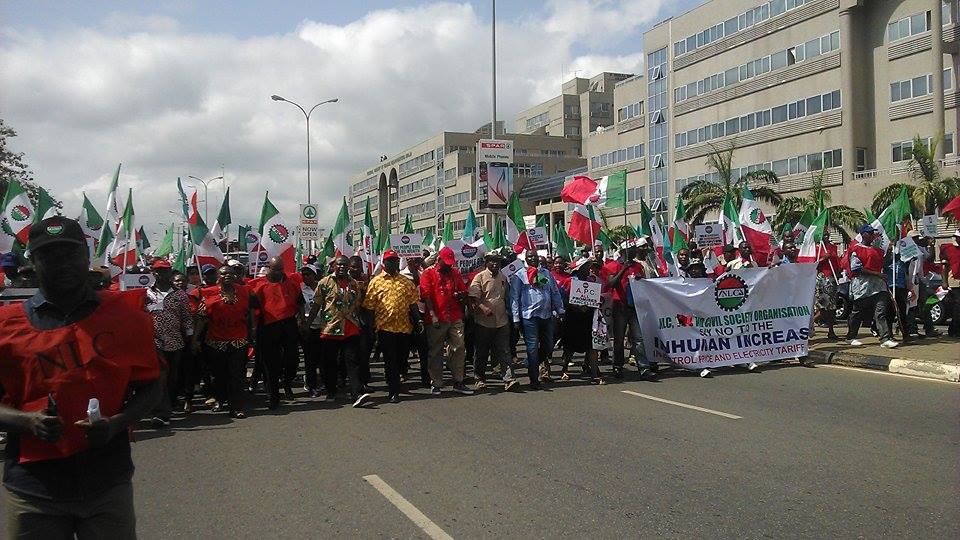 There have been controversies and confusion in the last two weeks over the mass action organised by the Nigeria Labour Congress and its civil society allies, to demand the reversal of fuel pump price hike and electricity tariff increase. It is imperative to state here that NLC and its allies have played a historic role in leading the working class to struggle against the neoliberal agenda of the state and the current government’s anti-poor policies.
There have been controversies and confusion in the last two weeks over the mass action organised by the Nigeria Labour Congress and its civil society allies, to demand the reversal of fuel pump price hike and electricity tariff increase. It is imperative to state here that NLC and its allies have played a historic role in leading the working class to struggle against the neoliberal agenda of the state and the current government’s anti-poor policies.
This article is a contribution to deepening the argument and intervention around whether NLC and radical CSOs have failed the working class people, this border around the controversies, how the trade unions have fared, including how the seeds of confusion were sown by some trade unionists, playing into the divide and rule aim of the bosses.
To start with, strikes and demonstrations at the beginning of this fourth republic 1999 till date have always received resounding support and solidarity. The response of the working class to mass actions have always been enthusiastic. The January 2012 general strike and its effects on the same issues is still very much impressed on our minds.
However, one cannot rule out the attendant participation of opportunist political elites who are part of the bosses’ class but pretended to have sympathy for the working people’s plight and interest l in our struggle against the 2012 fuel pump price increase. Indeed, many have asked the question whether there is any difference between the general strike of 2012 and the mass action of 2016. It is clear that the 2012 mass action was a peak of our struggles.
The 2016 struggle comes up with the same elements of corruption, total failure of government to revamp the four refineries, or building new ones and non-challant attitude toward poor people’s welfare. But, the context appears different. The “change” government of APC still appears to have many Nigerians sucked up in the illusions it peddled to win power.
But, the working class’ welfare and emancipation remain central to our struggle and we cannot but fight our oppressors. Whether it is in 2012 or now in 2016, one thing is certainly paramount, the Nigeria state and it collaborators {oil marketers, IMF and World Bank} do not mean well for us. We must not relent in fighting against their policies.
The substantive issues of the strike did not go without controversies as the foregoing argument stated above. Even though workers are already under harsh economic condition, where the prices of basic commodities including goods and services have increased {tomatoes increase by 25%, transportation over 50%, bag of rice over 70%} and there is failure of state governments and local Government to pay workers’ salaries as when due, there is some level of support for the Buhari regime which affected the strike.
This is because the APC makes it seem that the sins of the entire capitalist class were just sins of the PDP. Meanwhile all of them are the same and the APC does not mean well for the working people. As the impact of its policies takes its toll, more and more from the ranks of the working masses will come to appreciate the historic stand of the NLC.
The Nigerian labour movement was born out of the general nationalist response to colonial political economy, and had an uninterrupted history of militancy between 1940 up to the advent of military rule in 1966. But this rich history was also marked by perennial factionalism, splits, grouping and regrouping within labour unions, central labour organisation and workers, as well as moments of confusion in some capitalist leaders or the other, but which passed away. This was because the working class movement as a whole maintained a continuous influence on the struggle of the working masses as a whole, of which the 2012 general strike is a remarkable reference.
Today, the struggle wheels might appear obstructed by factionalisation, splits and pull out, on the basis of accrued interest and intrigues as played by the federal government of Nigeria. Indeed these are times of trial and tribulations where the machinery of the state are let loss through the media. The hegemony of the capitalist media coverage of the strike portrayed a perspective and narrative of failure, understandably dominating both newsprints and electronic media promoting the bosses’ interests. This speaks volumes that the state as the ideological and repressive institution of the capitalists will always work against the working class’ liberation.
The strike might be over for now, but the struggle is far from over; issues and more critical matters are going to arise, even as NLC, CSOs and the Federal Government go into negotiations. The unjustified and illegal hike in electricity tariff and increase in pump price of petroleum product are meant to favour the oil marketers and DISCOs (working class pays for darkness). In all, these are detrimental to poor people, undermining their purchasing power. Indeed, the minimum wage comes to mind and the urgent need for an upward review cannot be overemphasized.
We must learn from our struggles as the working class, overcome our setbacks, and set our ultimate aim at the self-emancipation of our class. Each battle we wage is part of a war, a class war between us; poor working class-people and the rich who get richer at our expense.
by Adefolarin A. Olamilekan








